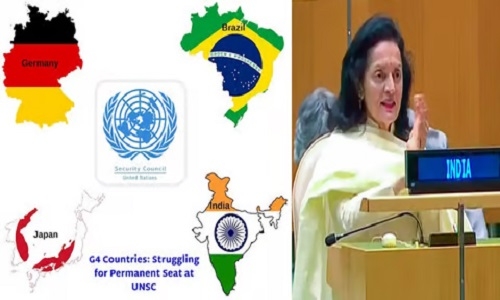UNSC reform model India presents on behalf of G4
09 Mar 2024 11:03:02

UNITED NATIONS,
INDIA has presented a detailed model on behalf of the G4 nations for Security Council reform that includes new permanent members elected democratically by the General Assembly and displays flexibility on the veto issue.
Participating in the Intergovernmental Negotiations on Security Council reform (IGN) on Thursday, India’s Permanent Representative to the UN Ambassador Ruchira Kamboj said the UN’s 80th anniversary next year serves as a milestone to achieve concrete progress on the long-pending subject.
Kamboj presented the ‘G-4 model’ on behalf of Brazil, Germany, Japan and India for debate, dialogue and finally negotiations. The proposals elicited strong support from wider UN members.
“The realities of 1945, when the Council was established, have long been superseded by the geo-political realities of the modern era and a new century; with the need for change being felt across the board,” Kamboj said as she shared the exhaustive G4 model with UN Member States in the General Assembly. Catering to these new realities, the G4 model proposes that the Security Council’s membership increase from the current 15 to 25-26, by adding six permanent and four or five non-permanent members. Among the six new permanent members, two each are proposed to be from African states and Asia Pacific states, one from Latin American and Caribbean states; and one from Western European and Other States.
The G4 model notes that the current composition of the Security Council, with its “glaring under-representation and un-representation” of key regions in both categories of membership, is “detrimental” to its legitimacy and effectiveness. It stressed that the Council’s inability to address critical conflicts and maintain international peace and security underscores the urgent need for reform.
“Any reform that does not address the lack of representation, particularly in the permanent category, would only exacerbate the current imbalances in the Council’s composition and render it ill-equipped to address today’s international challenges,” she said.